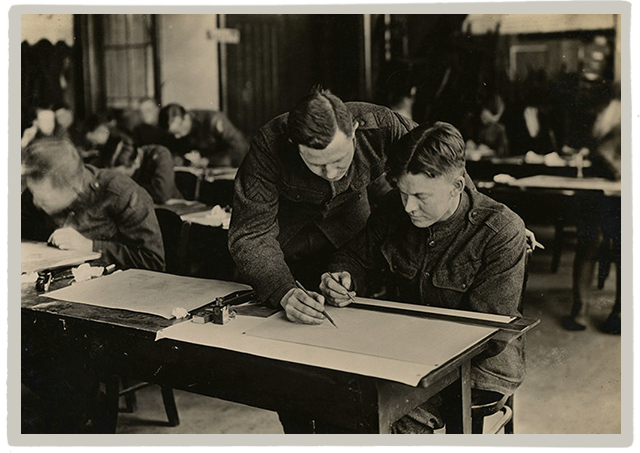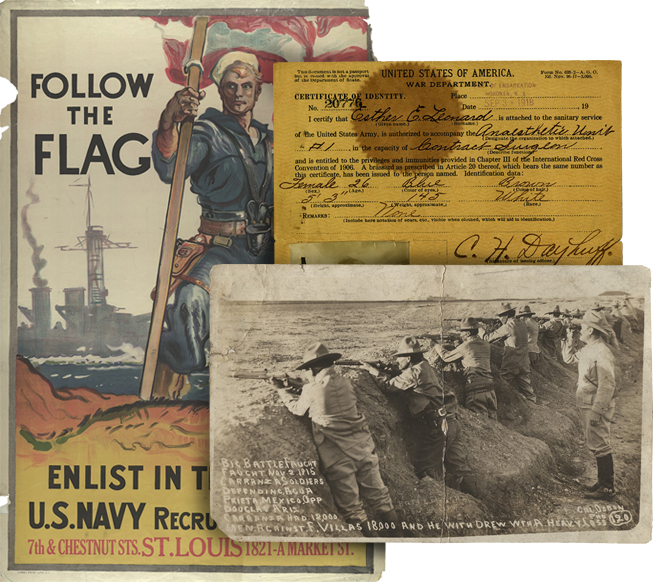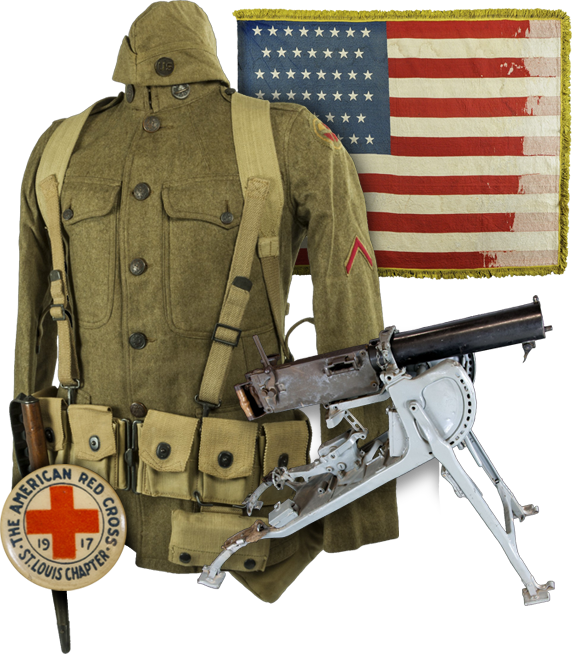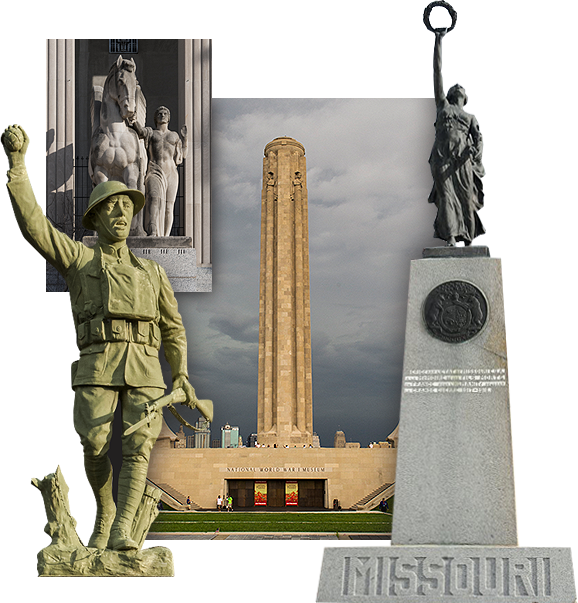Paul Lindemann letter to W.C. Kohn - October 4, 1918

Transcript
[October] 4th, 1918. Prof. W.C. Kohn, Concordia Teacher

Transcript
[page 2] W.C.K. 10/4/[1918] Before presenting to you the decision to which the Eastern Board, after much deliberation and after much consultation with others has come, I desire to state to you the condition of affairs as they will probably shape themselves in the future. Our whole future work naturally depends upon whether or not the government will modify the recent camp pastor order. The large committee of the Federal Council of Churches had a long interview with Secretary Keppel not long ago. At this interview the question was thoroughly aired. Keppel also attended a meeting of the Federal Council where the question was again discussed at length. Every possible pressure has been brought to bear upon him. After the committee was thru with him, he asked that a small committee of three be appointed to discuss the matter with three men that he might appoint. We are most anxiously awaiting his decision. To my mind there are three possibilities. The first possibility is this: That the government will permit the camp pastor to continue work in the camp, but will permit only one of each denomination. This is, of course, only a hope, and we have absolutely no reason to expect such a modification of the order. If, however, this step should be taken on the part of the government, it will be absolutely necessary for us to come to an harmonious understanding with the National Lutheran Commission, unless Missouri wants to represent itself as a distinctive set. If that is the case, then I am thru with the whole business. As a matter of fact, however, the government would not regard us as a distinctive denomination and there is no use, in the government

Transcript
[page 3] W.C.K. 10/4/[1918] consideration of that phase of the question will convince the board that such a proposition is impracticable. The idea of the government is to strengthen the position of the chaplain and its intention is to get away entirely from the camp pastor idea. If it makes the concession that denominational needs may be recognized by permitting one man of certain denominations to work in the camps, they will not permit another camp pastor of that same denomination to work outside of the camp, unless it be for strictly social welfare work. Two weeks ago the Army Intelligence Bureau made a thorough investigation of the National Lutheran Commission office and our office. They spent three days in the place going thru all our letter files. They inquired as to what the intentions were in regard to the new camp pastor order. They inquired very pointedly as to whether or not the boards intended to carry on the work outside of the camp in a sort of semi-defiance of the government

Transcript
[page 4] W.C.K. 10/4/[1918] fostered, as it surely will be if we insist on our previous policy of having one of our men connected with every camp, then our camp pastor will occupy an absolutely isolated position. So even if this camp pastor order is modified to such an extent that one Lutheran is permitted in every camp, we must back down from the position of exclusiveness which we have tried to occupy during the last year and which has been for the most part such a dismal failure. The second possibility is, and, unless something unforeseen happens, this is really a probability, that the government will enforce the order of having the camp pastors barred from the camps. In this case again we must simply have an arrangement of closer co-operation with the Commission. Naturally the work outside of the camp, if it is permitted, will curtail to a great extent the usefulness of a camp pastor. Until now there has been in most of the camps enough work for two men, simply because the men were enabled to do personal work among the thousands of boys not only of the Lutheran Church but of other churches. If the camp pastor order is enforced the government will give absolutely no recognition to the camp pastor idea. At Camp Gordon the camp pastors were told that if the order is enforced and they do their work outside of the camp they would not even be permitted to come into the camp in civilian clothes on visiting days, since they represented the camp pastor idea. If then, always under the supposition that the order will be enforced, our Central Board decides that they will, without considering the other Lutherans, and without any spirit of really harmonious co-operation, put buildings and men outside of the camps, we are in the estimation of the Eastern Board cooking up some new trouble which is going to call down upon us the forceful action of the government. The government will have absolutely no objection in my mind if the leisure hours of the boys are linked up with certain church activities, and they certainly will have to concede that we have the right to have a place where our boys may congregate in their leisure hours, but we surely will have to be extremely careful not to parade before the officials our synodical differences. We can hardly expect the National Lutheran Commission to enter into a new agreement of co-operation which means merely opposition and antagonism, particularly in fields where they have sufficient facilities to take care of the social needs of the boys and also facilities for church services. When we as aliens come down into the southern field and plant a building there, we are, of course, within our legal rights, but such a policy certainly is not conducive to the really effective carrying on of our war work. Also in this

Transcript
[page 5] W.C.K. 10/4/[1918] contingency we must consider the fact that the money expended for the erection of a special Missouri Synod social center and the full time of the kind of minister that we want to minister unto the boys, is unwarranted. In fact, I am certain that we should not be able to get the proper kind of men to give up their important congregational work for the job of sitting around all week waiting for stray boys to come in without an opportunity to round them up and without even an effective opportunity of inviting them to the services. We must come to some equitable arrangement with the National Lutheran Commission in order to avoid a duplication of work and the wasting of our man power. The third possibility is that the government will permit a certain amount of camp pastor work in the camps, but that it will insist that some Protestant committee be created which will have full responsibility over the appointment of these men, as, for instance, the Federal Council Chaplaincy Committee has at the present time. It is not at all improbable that some such arrangement will be made; that a committee will be created and that we will be compelled to submit our names to this committee just as we do at the present time to the Chaplaincy Committee at Washington. Again, in this case, this committee will not consider synodical lines, just as little as it considers synodical lines in the appointments of chaplains. And if we come to such a committee with our synodical grievances we are going to antagonize it from the outset and ruin our chances of getting an appreciable number of appointments. It is in our own interest that we act as a unit in such a case with the other Lutheran bodies. If we do this we shall have no difficulty in securing more than a fair proportion of our appointments, since the Lutheran men of other synods frankly admit the splendid quality of men whom we have had working in our camps. With these three policies as possibilities we are simply up against the proposition of backing down from the everlasting riding of principle and get down to the basis of the best method of serving our boys. Naturally with the whole question up in the air, your Eastern Department, in spite of the lengthiest and most thorough deliberation, could not outline a definite policy and suggest it to you. I may frankly state that the members of the committee here in New York have one and all been from the outset not in sympathy with the haphazard arrangement we have had with the National Lutheran Commission. I am absolutely certain that at least five members of the committee have been from the outset convinced that

Transcript
[page 6] W.C.K. 10/4/[1918] only full co-operation with the other Lutheran bodies was feasible. We hoped when the original five points were readopted in that celebrated conference that the plan might work out. Everything, of course, depended on the spirit in which the five points of agreement were viewed and put into practice. We hoped that the spirit of distrust prevalent among the members of the Western Board against the members of the National Lutheran Commission would in the course of time disappear. This has not been the case. The breach has not been healed. The men of the Commission feel that they are not trusted and that there never has been out West a real desire for co-operation, nor even a desire to recognize the work of the National Lutheran Commission. On the other hand, the Chicago Board has always feared that the Commission was trying to push it aside and to place it into a subordinate position. The members of your Eastern Board have worked tooth and nail to try to bring two very aloof bodies together and to smooth over the difficulties which naturally always arise where there is mutual lack of confidence. We have managed to keep things afloat for some time, but in the end it is really impossible to mix oil and water, and we have come absolutely to the end of our rope. We have always maintained the position that in the camps the principles of our synod simply cannot be applied as they are in congregational life. We hold that we are treating with individual souls in the camps, who for the time being are turned away from all congregational connections and placed in an extraordinary condition. We are dealing with souls that need ministration; souls to whom we have to proclaim the fundamentals of Christian religion; souls that may in a very brief time be face to face with death; and we have, therefore, personally cared very little what denominational handle a person bore. We also believe that the pastor who works in the camp should be considered as an individual in this present emergency and aside from his synodical connection. If he is a thorough evangelical man and sound in Lutheran doctrine and practice, I personally have absolutely no objection to permit him to serve my boys. If we were fully connected with the National Lutheran Commission I am absolutely certain that we could sway the policy completely and could insist that no man be appointed to camp pastor work who is not in full accord with Lutheran principles and who may be absolutely depended upon to proclaim unto the boys the fundamentals of Christian religion. As a matter of fact, I know of only two men now engaged in camp work whose Lutheranism might be called into question. I know that the officials of synod take an altogether different stand and viewpoint, but I believe they are absolutely

Transcript
[page 7] W.C.K. 10/4/[1918] wrong, and the trouble is that it is not only the Eastern Board who is not in agreement with them but there is a sentiment which is very widespread in our circles which has me frankly worried. I am not inclined to conjure up any spooks, but there is not only among our laity, but also among our clergy a very violent spirit of resentment against the policy which our Synodical Conference is pursuing at the present time and this sentiment is prevalent not only in the East, but in many sections of the West. We are really afraid that a break with the National Lutheran Commission and the consequent necessary resignation of the Eastern Board would be sufficient to start to fan this smoldering discontent into flame. It has been worrying me for the last six months. Every day this week and the full part of every day I have been in consultation with various men trying to find some method which would satisfy the sentiments and the rigid position of synod

Transcript
[page 8] W.C.K. 10/4/[1918] to us it will be a calamity and we have no intention of being a party to it. Please bear in mind that we have come to this decision of having a really authoritative board out here to deal with the National Lutheran Commission only after the most careful deliberation. We well know what the decision means. We know that it will mean and must mean a closer co-operation with the National Lutheran Commission. We know that it must mean that in view of the new conditions that will no doubt arise we will have to be content to have one of our men in one camp and one of the Commission

Transcript
[page 9] W.C.K. 10/4/[1918] by all. I already hear some members of your board say that such an arrangement is impossible. We are, of course, ready to hear other suggestions. The whole thing is simply up in the air and that is why we insist that you come out here for a frank discussion of the whole situation. We are well aware of the fact that even the present policy and the past policy of co-operation with the National Lutheran Commission has not been favorably looked upon by some of the Synodical Conference. Some of the members of our committee were of the opinion that the President should be invited to come out with you. There is absolutely no objection to his coming, altho I am afraid that discussion of the question with him would be rather useless. As I mentioned before, I am sincerely worried about what the whole business may lead to. Please bear in mind that the dissatisfaction with they synodical policy is not confined to a few cranks who happened to be members also of the Eastern Army and Navy Board, but that the sentiment of dissatisfaction is widespread and deep-rooted. I am personally most deeply concerned lest a breach should occur in our synod and it is not an idle fear that such a breach is possible. I have had occasion to visit quite a number of conferences during the last year and have found a general ferment of dissatisfaction, and the remarkable part of it is that this sentiment is not confined to the

Transcript
[page 10] W.C.K. 10/4/[1918] I have written you a lengthy letter and I hope that it has persuaded you that your presence here next week for several days is a positive necessity. With cordial greetings, I am Fraternally yours, Paul Lindemann. PL/HN
Details
| Title | Paul Lindemann letter to W.C. Kohn - October 4, 1918 |
| Creator | Lindemann, Paul |
| Source | Lindemann, Paul. Letter to W.C. Kohn. 04 October 1918. Graebner, Theodore Collection. Concordia Historical Institute, St. Louis, Missouri. |
| Description | Letter to W.C. Kohn, President of the Lutheran Church Board for Army and Navy, from Paul Lindemann. Lindemann was concerned with an order implemented by the War Department making it difficult for Lutheran pastors to work in military camps. In order to work in a camp, pastors would apply for commissions as chaplains. Lindemann emphasized cooperation between the National Lutheran Commission and the Lutheran Church Board for Army and Navy in order for Lutheran camp pastors to continue their work as non-commissioned pastors in military training camps. |
| Subject LCSH | World War, 1914-1918--Public opinion; World War, 1914-1918--Religious aspects; Lutheran Church |
| Subject Local | WWI; World War I |
| Contributing Institution | Concordia Historical Institute |
| Copy Request | Transmission or reproduction of items on these pages beyond that allowed by fair use requires the written permission of the Concordia Historical Institute: 314-505-7900 |
| Rights | The text and images contained in this collection are intended for research and educational use only. Duplication of any of these images for commercial use without express written consent is expressly prohibited. |
| Date Original | October 4, 1918 |
| Language | English |



